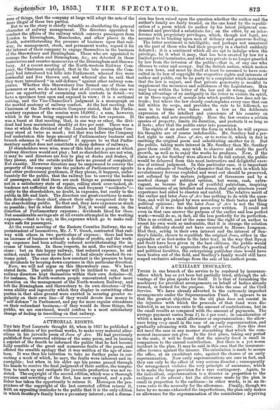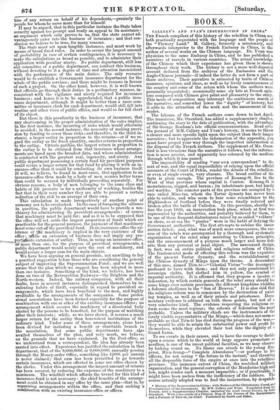AUXILIARY INSURANCE.
TIIEBE is one branch of the service to be rendered by insurance- offices which has as yet been but partially tried, although the ad- vantage of the plan speaks for itself. It is that of fuhushing the machinery for provident arrangements on behalf of bodies already formed, or formed for the purpose. To take the ease of the Civil Service. We have already adverted to the extremely imperfect arrangements under the Superannuation Fund. It appears to us that the greatest objection to the old plan does not consist in the injustice with which the proceeds of that fund were dis- tributed, in an inverse ratio to the amount of contributions, but in the small results as compared with the amount of payments. The average payment varies from 21 to 5 per cent; in consideration of which a man gets a small allowance or superannuation ; the allow- ance being very small in the case of an early superannuation, and gradually advancing with the length of service. Now this does not meet the case in any manner resembling that which the com- monest insurance can give. In the first place, taking any period in the scale, it will be found that the annuity fixed is small in comparison to the annual contribution. But there is a yet worse incident in the plan. It may be said in this case that the insurance- office insures against the insurer. The calculation is made to secure the office, at an exorbitant rate, against the chance of an early superannuation. Now early superannuations are rare in fact, and they can only be the effect of very serious disaster ; consequently the arrangement violates the very principle of assurance, which is to make the large provision for a rare contingency. Again, to the individual, superannuation is a disaster in proportion to the earliness of its advent ; but the allowance made by the plan. is small in proportion to the earliness—in other words, is in an in- verse ratio to the necessity for the allowance. Finally, though we have by no means exhausted the imperfections, the plan only makes an allowance for the superannuation of the contributor; depriving
him of any return on behalf of his dependents,—precisely the people for whom he cares more than for himself. It may be argued, that in this particular instance the State takes security against too prompt and ready an appeal to its assistance : an argument which only proves to us, that the state cannot ad- vantageously enter into the 'business of insurance ; and that con- clusion we believe to be true, for many reasons. The State must act upon tangible instances, and must work by means of broad fixed rules. In order to secure the largest amount of probability in case of certain contingencies it is necessary to make the calculations as broad as possible, and administer their application with peculiar nicety. No public department, still less any committee of a public department, can conduct this business, without devoting to it a degree of time and attention inconsistent with the performance of the main duties. The only resource would be to establish a Government insurance department for the whole of the public services • and there might be reasons in favour of such a project. On the Other hand, however, it is well known that officials go through their duties in a perfunctory manner, in- consistent with the vigilance and nicety required for insurance business ; and hence it is to be apprehended, that a public insu- rance department, althongh it might be better than a mere com- mittee or insurance clerk for each department, would still fall into routine and other vices of public offices, and would so far fall short of its object.
But there is this peculiarity in the business of insurance, that any shortcoming in the proper administration of the rules implies, in the first instance, the incurring of risks which would otherwise be avoided; in the second instance' the necessity of making provi- sion by funding to cover those risks ; and therefore, in the third in- stance, a larger outlay in proportion to the returns—or if we re- gard the outlay as the fixed quantity, smaller returns in proportion to the outlay. Citteris paribus, the largest return in proportion to -the outlay is to be obtained from that insurance whose arrange- ments are based upon the broadest data, and whose administration is conducted with the greatest zeal, ingenuity, and nicety. Any public department possessing a certain fund for provident purposes could secure a larger return for that fund by placing it with an in- suranoe-office than it could by conducting its own business itself. It will, we believe, be found in most cases, that application to an insurance-office thus made by a body of men secures better terms than could be secured by individuals proceeding separately. For obvious reasons, a body of men belonging to the same class and habits of life presents so far a uniformity of working, besides the fact that in their very number they are able to present a certain reduction of the risk to an average of their own.
This calculation is made irrespectively of another point of economy not to be overlooked. In the case of foregoingthe alliance in question, the public department would have to provide a ma- chinery for administering its provident arrangements : of course that machinery must be paid for; and as it is to be supposed that the office will set aside the largest proportion of funds which are practicable for the general purpose the payment of that machinery must come outArf the provident fund. In an insurance-office the ex- istence of tile machinery is implied in the very existence of the office ; 3/0hile an extension of business does not imply any pro-
.---__ortietfitate extension of outlay. Thus, in using an insurance-office, or more than one, for the purpose of provident arrangements, a public department would nearly save the cost of machinery, and would secure a larger sum for the main objects. We have been arguing on general grounds, not unwilling to lay a practical suggestion before those who are considering the general subject of improving the Superannuation Fund ; and we are well aware that the plan which we suggest has been adopted in more than one instance. Something of the kind, we believe, has been done on two of the Metropolitan Railways—the Brighton and the North-western. Indeed, the railway companies with all their
faults, have in several instances distinguished companies, by in- culcating habits of thrift, especially in regard to provident ar- rangements which have been beneficial to the men, and highly creditable to the arrangements of the companies. Some profes- sional associations have been formed especially for the purpose of combination with one or other of the existing insurance-offices ; an arrangement which secures the machinery of a directorial body elected by the persons to be benefited, for the purpose of watching after their interests ; while, as we have shown, it secures a much larger return for the outlay than benevolent institutions of the ordinary kind. Under some of these arrangements, plans have been devised for including a benefit or charitable branch in the association. But some public departments have also availed themselves of the plan, and very much, we believe, on the grounds that we have explained. In the Post-office, as we understand from a correspondent, the idea has already been carried into effect. Experience has justified the calculation in that department, that of the 8,000,000/. or 9,000,000/. annually passing through the Money-order Office, something like 12001. per annum is never claimed ; that sum has been permitted to go towards certain insurances, which are effected in some one office chosen by the clerks. Under this arrangement the largest amount of returns has been secured, by reducing the expenses of the machinery to a minimum. The windfall which affords the kernel for this kind of insurance-fund is not necessary : the chief benefits of the arrange- ment could be obtained in any office by the same plan—that is, by organizing arrangements within the office, and then seeking a coinhination with an existing insurance-office or offices.



























 Previous page
Previous page